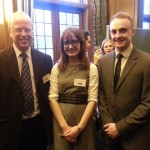There are few things more gratifying for any academic teacher than seeing one’s students succeed. The following is such a success story:
Abi Cousins, a current finalist in our department, recently won at the 2013 Reading Undergraduate Research Opportunities Programme (UROP) showcase event with a poster that displayed the main findings of her UROP project ‘Communication Disorders in the Ancient World: Lack of Language, Lack of Power?’. The project was carried out under the supervision of Prof. Peter Kruschwitz, and since then it has resulted in a preliminary publication of their findings in the JACT journal Omnibus.
In recognition of Abi’s excellent achievements, the University of Reading gave her the opportunity to present her research at the 2014 Posters in Parliament event in London on 25 February, organised by the University of Central Lancashire and the British Conference of Undergraduate Research.
In an overall heavily science-dominated setting, Abi’s poster – the only submission in the area of Classics from the entire UK and one of the very few posters based on Arts-and-Humanities-related projects – attracted significant attention: even after an hour and a half of answering questions (in what was planned to be a one-hour slot), Abi still found herself answering questions and offering offprints of her co-authored article.
Abi said: ‘It was an excellent opportunity and a great chance to meet people genuinely interested in my work as an undergraduate and talk to them about something I was passionate about. A long day but so much fun and so rewarding.’
- Abi explaining her research project
- …and explaining…
- …and explaining…
- …at the busy Posters in Parliament event.
- Team Reading at the reception: Dr John Thompson (UROP officer, Reading), Ms Abi Cousins (Classics), Mr Jake Gristey (Meteorology)
Prof. Kruschwitz, who also attended, said: ‘It is excellent to see that University of Reading shows its ongoing, substantial support for, and belief in, Undergraduate Research, which gives due credit to all academic disciplines, including those of the Arts and Humanities. Abi has done herself proud – again! –, and she was a wonderful, enthusiastic ambassador both for the excellent things we do here at Reading and for her academic discipline. Our department has a long track record in successful engagement with undergraduate research (including a number of publications derived from such projects), and today has added an exciting new chapter to this lasting success story.’






